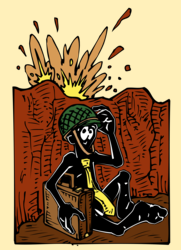 Solidarity Peace Trust, a faith-based non-governmental organisation in South Africa, has just released a report on the role of South Africa in the current Zimbabwean crisis. Since the implementation of the Zimbabwean government’s land redistribution program in 2000, the key contributors to the country’s GDP (agriculture, manufacturing and tourism) have collapsed. Unemployment is around 80%. Tourism earnings have halved. Agricultural production has contracted by more than 50%.
Solidarity Peace Trust, a faith-based non-governmental organisation in South Africa, has just released a report on the role of South Africa in the current Zimbabwean crisis. Since the implementation of the Zimbabwean government’s land redistribution program in 2000, the key contributors to the country’s GDP (agriculture, manufacturing and tourism) have collapsed. Unemployment is around 80%. Tourism earnings have halved. Agricultural production has contracted by more than 50%.
The economic crisis has forced many highly educated citizens to leave Zimbabwe, and this has precipitated the collapse of the health and education public service sectors. The recently passed Indigenisation Act requires majority ownership of all businesses to be transferred into indigenous hands, and this is expected to add to the wealth of the ruling elite, rather than addressing any of the economic problems.
South Africa has maintained a stance of “quiet diplomacy”, aiming to prevent “a complete collapse of authority in Zimbabwe”. Thabo Mbeki has opposed the use of economic sanctions, preferring a policy of appeasement. Meanwhile, a number of South African companies have found ways of profiting from the economic chaos in Zimbabwe.







